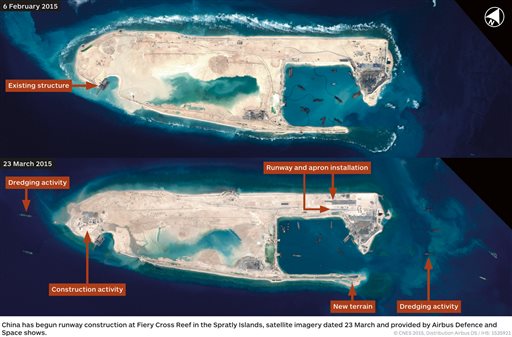China, US assert rights after exchange over South China Sea

This combination photo of satellite images taken on Feb. 6, 2015, top, and March 23, 2015, bottom, by Airbus Defense and Space, and distributed by IHS Jane’s Defense Weekly, shows what IHS Jane’s describes as an airstrip on Fiery Cross Reef in a disputed section of the South China Sea. AP FILE PHOTO
BEIJING— China said Thursday it is entitled to keep watch over airspace and seas surrounding artificial islands it created in the disputed waters of the South China Sea (West Philippine Sea), following an exchange in which its navy warned off a US surveillance plane. The United States said its aerial patrolling was in accordance with international law and “no one in their right mind” would try to stop it.
Neither side says it wants confrontation with the other, but as China seeks to assert its expansive claims to the South China Sea, the US is pushing back and trying to demonstrate that China’s massive land reclamation does not give it territorial rights.
A news crew from CNN reported it witnessed an incident Wednesday in which a Chinese navy dispatcher demanded eight times that a US Navy P8-A Poseidon surveillance aircraft leave the area as it flew over Fiery Cross Reef, where China has conducted extensive reclamation work. It said the US crew responded that they were flying through international airspace, to which the Chinese dispatcher answered: “This is the Chinese navy … You go!”
READ: ‘Go away,’ China tells US spy plane in West PH Sea — report
The Center for Strategic and International Studies think tank posted more video Thursday of the aerial patrol above the Spratly island chain which it said had been released by the US Navy.
Speaking at a regular daily briefing, Chinese Foreign Ministry spokesman Hong Lei reiterated Beijing’s insistence on its indisputable sovereignty over the islands it has created by piling sand on top of atolls and reefs.
While saying he had no information about the reported exchange, Hong said China was “entitled to the surveillance over related airspace and sea areas so as to maintain national security and avoid any maritime accidents.
“We hope relevant countries respect China’s sovereignty over the South China Sea, abandon actions that may intensify controversies and play a constructive role for regional peace and stability,” Hong told reporters.
In Washington, Daniel Russel, the top US diplomat for East Asia, said the flight of a US reconnaissance plane in international airspace over the South China Sea was a regular and appropriate occurrence. He said the US will seek to preserve the ability of not just the United States but all countries to exercise their rights to freedom of navigation and overflight.
“Nobody in their right mind is going to try to stop the US Navy from operating. That would not be a good step. But it’s not enough that a US military plane can overfly international waters, even if there is a challenge or a hail and query” from the Chinese military, he said.
“We believe that every country and all civilian actors also should have unfettered access to international waters and international airspace,” he said.
China’s construction has intensified frictions among competing parties in the South China Sea, which Beijing claims virtually in its entirety along with its scattered island groups. The area that is home to some of the world’s busiest commercial shipping routes is also claimed in part or in whole by the Philippines, Taiwan, Brunei, Malaysia and Vietnam.
READ: PH can’t rely on US in sea dispute vs China, say solons
The US and most of the 10 members of the Association of Southeast Asian Nations (Asean) want a halt to the projects, which they suspect are aimed at building islands and other land features over which China can claim sovereignty and base military assets.
The US says it takes no position on the sovereignty claims but insists they must be negotiated. Washington also says ensuring maritime safety and access is a US national security priority.
China is also at odds with Japan over ownership of a group of uninhabited islands in the East China Sea that are controlled by Tokyo but also claimed by Beijing, leading to increased activity by Chinese planes and ships in the area, which lies between Taiwan and Okinawa.
Both sides have accused the other of operating dangerously, prompting fears of an incident such as the 2001 collision between a Chinese fighter jet and a US surveillance plane in which the Chinese pilot was killed and the American crew detained on China’s Hainan island.
Also Thursday, the Chinese air force announced its latest offshore training exercises in the western Pacific as part of efforts to boost its combat preparedness.
People’s Liberation Army Air Force spokesman Shen Jinke said the exercises were held in international airspace but gave no specifics. In its report on the drills, state broadcaster CCTV showed a video of Xian H-6 twin-engine bombers, a Chinese version of Russia’s Tupelov Tu-16, in flight and landing at an air base, although it wasn’t clear when the video was shot.
For comprehensive coverage, in-depth analysis, visit our special page for West Philippine Sea updates. Stay informed with articles, videos, and expert opinions.